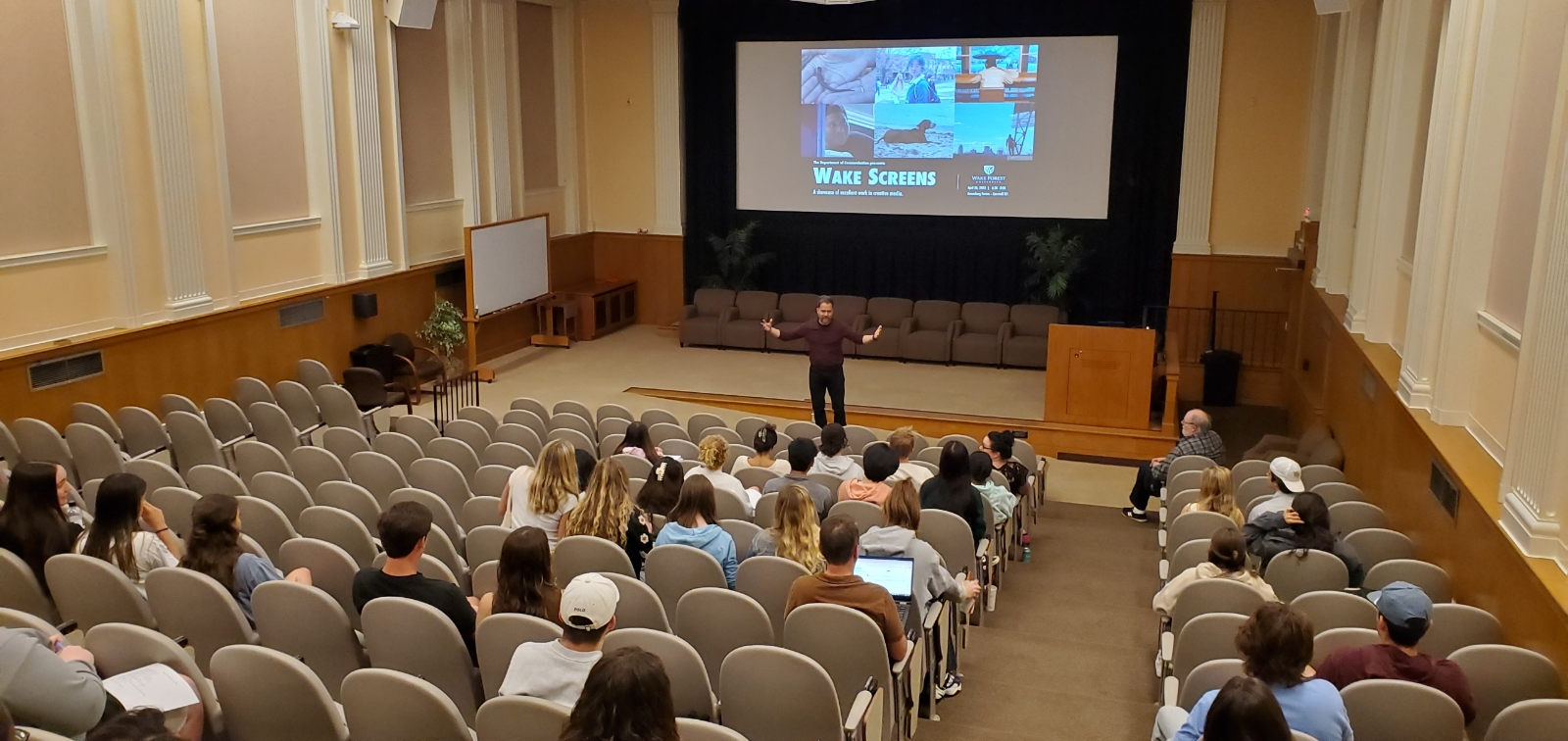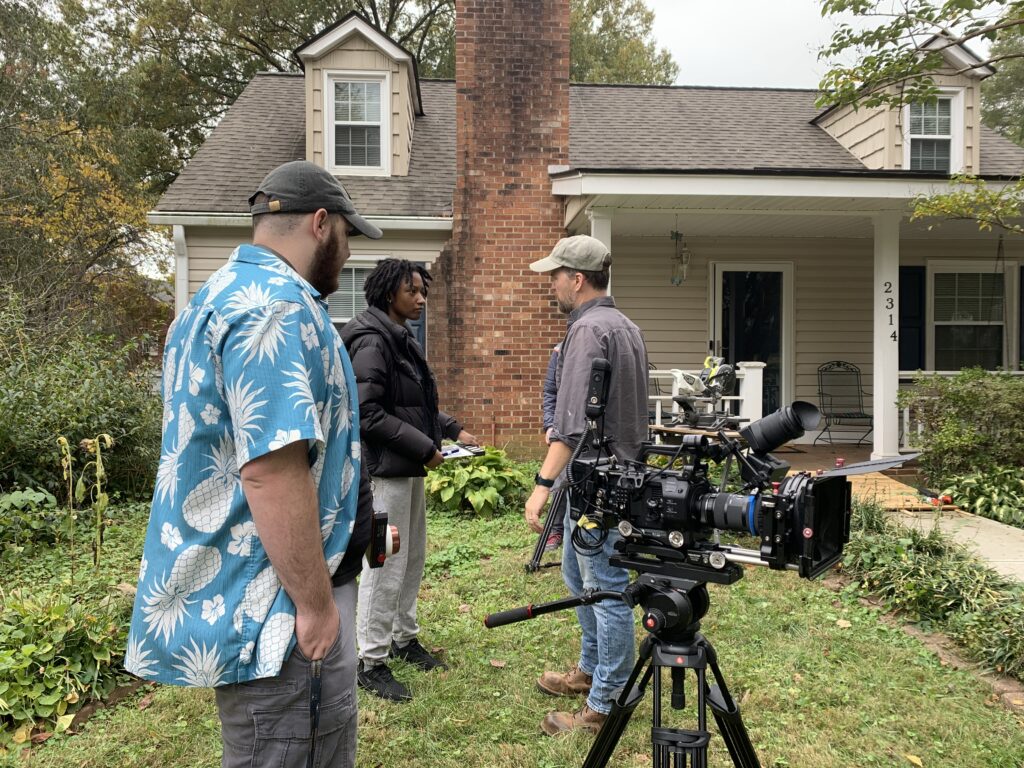How Creative Humility Made Students’ Screenplays More Sublime
Cagney Gentry changed parts of his film studies course to encourage curiosity by looking for small stories. The results helped students see a bigger world beyond their own.

For the last assignment in his screenwriting course (COM 316-A), Cagney Gentry tried something different. Gentry, an assistant professor of the practice in the Department of Communication and a 2006 graduate of Wake Forest, used to let students write their final project—a screenplay for a short film—on any topic they wanted. Many of them were thinking big. Like, Avengers big. “They had an idea of what they were probably going to make, right?” Gentry says. And then, “I pulled the rug out from under them a little bit.”
Early in the spring 2022 semester at Wake Forest, Gentry’s students had to write a digital snapshot, an exercise inspired by screenwriter Richard Krevolin. In it, the professor would ask his students to remember a colorful character from their history and write a short story about a moment with that person. “Imagine the character first,” Gentry would tell his students. “Just somebody that comes to mind. A colorful, wild, crazy character.” Then, students had to put that character in a scene. They had to describe the character and the environment and figure out how those two things worked together.
“[The students created] little mini films,” Gentry says. “They were so good.”
So good, in fact, that Gentry made them the basis for that final assignment. “At the last minute, I said that your final script has to be based on, inspired by, or connected to your digital snapshot. And I really just left it at that.” The students still wrote their outlines together and workshopped their drafts, but the results were much different. Instead of going for something easy or familiar, students had to recalibrate on the fly and think about finding the best story in a small place. The resulting screenplays were alive with possibility and nuance. They were cohesive, unified, and sublime. “They ended up being some of the best scripts I’ve ever had,” Gentry says.
The assignment grew into more. During the spring semester, Gentry asked his students to interview another colorful character from their lives. He then told them to write three-to-four sentence microfictions. They’d share the interviews, the digital snapshots, and the microfictions with small groups within the class. Then they started to weave those tiny elements of story into larger narratives.
“They actually had a newfound attention to the fabric of story, and they found little stories in so many places,” he says. That model, of pushing students out of their comfort zone to see things in a new way, was in Gentry’s head during last summer’s Course Redesign and Development Workshop. “It got me thinking about this idea of creative humility and curiosity, and it got me thinking about the different learning activities that I could present to the class to get them to practice those virtues.”
Gentry attended the Program’s 2022 faculty workshop, thanks to a grant funded by the Lilly Endowment. This summer, after weaving what he learned into his course, he returned to the workshop to tell others about what he’d seen and what he’d learned. Elizabeth Whiting, the Director of Interdisciplinary and Engaged Learning in the Professional Schools, says the ultimate goal of the workshop is to empower faculty with the tools to help students develop virtues related to their chosen life purposes or professions. To get there, the Program’s staff and partners help faculty learn teaching strategies. It’s not a one-size-fits-all approach.“We can help people be more creative, strategic, and intentional practitioners,” Whiting says. “But the human learning process is too complex for us to be able to say, ‘If you do X, that will lead to Y.’ And actually that’s a feature, not a bug, of ethics education.”
After last year’s workshop, Gentry thought of a variation on a virtue he’d heard about from the presentations, not just humility but creative humility. “It’s this understanding that the best creative ideas for your project–whether that be a film or screenplay–are not necessarily going to come from you, right? Even though a creative project is your project, you have to be humble enough to realize that you need outside perspectives,” he says.
Creative humility, for one, can influence where a story comes from. “I think most of us think of writing as a solitary act where we’re going to come up with the best ideas for our project,” says Gentry. “But if we embrace this idea of creative humility, my hope is that you realize the perfect idea might be out there somewhere. It may not be something that you can think your way through. You have to put yourself in a position of unexpectedly discovering it, right? You have to open yourself to discovery, which links pretty well with curiosity.”
For Parker Beverly (‘23), discovery came in the form of memory. Beverly took Gentry’s screenwriting course during the Spring 2023 semester. She came in with little screenwriting experience, but with the spark of an idea. “I’ve always loved history, and I wanted to do something on an older character.” Gentry’s assignments made her focus on her remembrances of a real person. “I actually wrote about a former ballet teacher, Ms. Dorothy,” Beverly says. When Beverly was younger, Ms. Dorothy was in her 80s and still teaching. She’d been an important person to Beverly, one who’d mentored her dancers with tough love. “I took bits and pieces of her personality. She was a rugged character with an interesting life story.”
The pieces that remained in memory formed the basis for the fictional characters and the environment in Beverly’s final screenplay. Some recollections were vague. Others were vivid. “It made me think about how people interact with each other,” she says, “and how you remember them.”
Discovery takes time and space. And at Wake Forest, the creative humility and curiosity that fuels it often comes from what some students find to be a foreign concept: unscheduled time. “One thing I’m seeing in a lot of students today, especially at Wake Forest, is that they’re all really, really busy and they’re overloaded with classes,” Gentry says. “A lot of my students are athletes. So they’re also balancing the athletic schedules as well. One of the things that I’m seeing that’s a byproduct of that is that they’re very schedule- and task-oriented. They have to map out exactly what it is they need to do individually to be successful.”

Part of success in Gentry’s screenwriting course has to do with making time to not have an agenda, to open yourself up to something unpredictable. “You can make that time part of a schedule, but you have to go out and be curious in the world,” says Gentry, who turns that time for curiosity into an assignment. Students record diary entries. They write micro fictions. They have to articulate what they’re seeing and hearing around them. To practice curiosity. “That was part of my course redesign,” Gentry says. “I’m asking them to make time in that schedule to embrace outside forces. That’s not something that you can do alone, right? I think that part is challenging for a lot of students. They’re so used to being able to study or work their way to success.”
Beverly appreciated that observation was part of the syllabus. She spent her time with her earbuds out and her phone stashed, taking in things that she otherwise wouldn’t have seen, heard, or felt. “I think it made me realize that there are stories in everyday things,” she says. “There’s a lot more than meets the eye here.”
Creative humility also extends to receiving feedback. That part can be hard, because a screenplay is personal. “A script is something that you’ve created from your soul, from your heart, from your brain,” Gentry says. “And it hurts sometimes if it’s not good, right? And I’m asking you to share that with people. So that’s something that we have to push against a little bit in screenwriting education. We need to get people to realize that not only is it okay to be vulnerable with your cohort, with your peers, but it’s pretty necessary.”
Even though writing can start in the heart, it can’t end there, Gentry says. “I’m borrowing something I heard from Paul Schrader, a famous screenwriter: We’re in the business of airing our dirty laundry. That doesn’t mean everything has to be autobiographical, but it all starts from a place in here,” he says, tapping on his heart. “But then you have to open yourself up to a world of feedback. We also have to open ourselves up to the world around us for ideas and for inspiration to inform that story world. It’s not all just coming from in here.”
Helping students develop virtues can help them, in a direct sense, be better writers, filmmakers, and creative professionals. Whiting says the process—in Gentry’s class and others—starts with understanding what students value. “Then I think we should ask the question: ‘What are the virtues that are needed to achieve the goods that they already care about?’”
Gentry hopes that the virtues students think about in his class help them outside of his classroom and assignments. “I think it’s also developing a character trait that I think is really important, which is the ability to sort of step outside of yourself. It makes you a more agile person. A more compassionate person. You’re able to adapt better to the world around you.”
Beverly, who’s now a graduate student in Wake Forest’s Documentary Film Program, says the class’s focus on curiosity encouraged her to learn more. To show, and not to tell. Learning from and showing simple actions can be profound, she says. “That way,” she says, “the audience can figure it out for themselves.”
